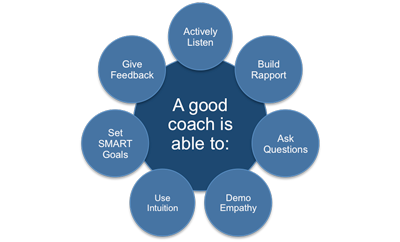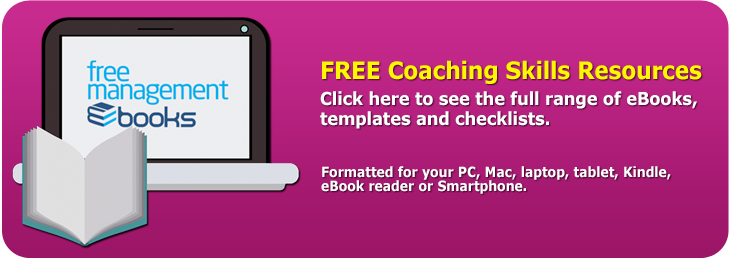Management Coaching Skills and Models
There is a set of key skills and competencies that all good coaches possess and that you will need to develop in order to be an effective management coach. The basics of these skills can be learned but they can only be perfected with practice and reflection.
 |
For example, you can be formally taught how to set goals and how to use questions effectively.
But it is only through regular practice that you will be able to build rapport and use intuition effectively. The essential competencies and skills you need to develop are:
• Active Listening
• Asking Questions
• Goal Setting
• Giving Feedback
• Building Rapport
• Demonstrating Empathy
• Using Intuition
In addition to these skills, there are a number of coaching models that you can use. A model is simply a predetermined procedure that provides a framework for navigating a route through a coaching session, as well as providing a means of getting the session back on track if necessary.
 |
It is a good idea to become familiar with the models available and then to use your own judgment about which of them to use and when. Not all coaching sessions need a model and you will need to be flexible in your approach. This eBook describes three well-known coaching models:
• GROW
• TGROW
• OSKAR
Regardless of the coaching model you decide to use, the culture and ethos of your own organization will have an impact on your ability to perform as a coach. Some organizations may lack an understanding of the value of coaching, not see it as a priority, or have a low level of coaching skills and experience available within the organization. These are issues that you need to consider and assess how extensive they are when deciding if coaching is the best way to develop your staff. If there are too many obstacles then you may find that attempting to use coaching will have a detrimental rather than a motivational effect.
Coaching can improve productivity, morale, and job satisfaction and make team members less dependent on you to solve their problems for them. The essential competencies and skills required by a successful coach are: active listening, asking questions, goal setting, giving feedback, building rapport, demonstrating empathy, and using intuition.
Management coaching has its roots in sports coaching, and the principles behind 'The Inner Game' developed by tennis coach Tim Gallwey form the basis of many management coaching models. These principles include: focusing on the present, concentrating on an 'action' rather than a task, and the coachee using their own knowledge and experience to improve their performance.
The GROW model is easily understood and straightforward to apply. It is an acronym of Goal, Reality, Obstacles, and Way forward. The 'Goal' is the endpoint that the coachee wants to achieve. It must be SMART so that the individual knows when it is attained. The 'Reality' requires the current issues and the challenges to be stated before an assessment of how far the coachee is away from their goal can be made. The 'Obstacles' stopping the coachee attaining their goal need to be identified so that the coachee can come up with different 'options,' or ways to deal with them. The 'Way forward' involves defining the necessary action steps required to achieve the goal.
The TGROW model was developed by Myles Downey, who felt that the addition of the item 'Topic' would make it more relevant to management coaching. This item enables both the coach and the coachee to understand the 'context' of the issue to be addressed.
OSKAR is an acronym for Outcome, Scaling, Know-how & Resources, Affirm & Action, and Review, and involves the coach asking questions in such a way as to move the coachee's attention away from problems in favor of solutions.
The 'Outcome' is the difference that the coachee (and those around them) wants to see as a result of the coaching.
'Scaling' determines to what extent the coachee believes the current situation is working.
'Know-how & Resources' enables the coachee to establish what factors are already contributing to getting the situation closer to the desired outcome.
'Affirm & Action' helps to build the coachee's self-belief, as well as enhancing their relationship with their coach. OSKAR represents a solution-based approach to coaching that accepts that people have problems rather than them being the problem!
To be a good coach you need to have an understanding of coaching principles. These are explained in our eBook 'Coaching Principles,' which describes the skills, attitudes, and behaviors you will need for running a successful coaching session. It also discusses the use of external coaches and the issues that confront managers who act as coaches to their own team.
The culture and ethos of your own organization will have an impact on your ability to perform as a coach. Some organizations may lack an understanding of the value of coaching, not see it as a priority, or have a low level of coaching skills and experience available. These are issues that you need to consider when deciding if coaching is the best way to develop your staff.
You may also be interested in:
Coaching and Active Listening | Asking Questions in a Coaching Session | Coaching and Goal-setting | Giving Feedback to the Coachee | Building Rapport with the Coachee | Demonstrating Empathy and Using Intuition in Coaching | Coaching Models and 'The Inner Game' | The GROW Coaching Model | The TGROW Coaching Model | The OSKAR Coaching Model | Organizational Barriers to Coaching.



